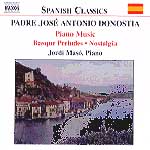The conservative idiom characterizing the piano music of Padre José Antonio Donostia (1886-1956) draws upon the more whimsical side of his contemporaries Debussy and Ravel, as well as Chabrier’s effervescent keyboard writing, Grieg’s rustic lyricism, and Fauré’s linear refinement. Traditional Basque folk songs provide the basis for the 21 Basque Preludes plus the six shorter works that fill out this disc. While Donostia reproduces the songs in straightforward, unadulterated fashion, he decorates them with imaginative harmonic progressions and vibrant, resourceful pianism. I imagine that these works must be as grateful to perform as they are delightful to hear, if we go by Jordi Masó’s masterful, fluid performances. His melodic shaping and rhythmic fluency over the course of the 21 Preludes, for example, easily surpasses Ricardo Requejo’s slower and choppier readings on Claves. If you missed this attractive release on Marco Polo in 2000, grab it now on Naxos for half the price.
































